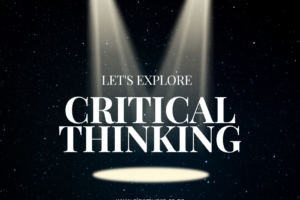What is critical thinking? When we hear the phrase ‘critical thinking’ we tend to assume…

Widening the lens series – Part 1 Super-Vision
During this series of blogs we will look at our everyday workplace practice and how we can increase our professional effectiveness.
Having just spent a couple of hours with a very talented young photographer the title of this blog (Widening the lens) seems like a terrible play on words. However the post event chat in the carpark proved to be a great example of ‘case in point’.
This particular lady is passionate about Branding photography and was explaining to me how she likes to explore the person (her client) with a wider lens so that she is able to capture in her pictures, that person as a whole and the intricacies that make up who they are.
Despite the rather cautionary name, Supervision is the same sort of relationship. You see, I prefer to call it Super Vision as in, a widening of your lens.
So often in business (and life), we become so unaware of the assumptions and judgments that we make, or the unconscious bias that we apply to everyday decision making.
This is something that we all do on a regular basis, often without thought and mostly it’s not later reflected upon or challenged.
Let me give you a simple example;
Tom (not his real name) was looking to hire a part-time employee for his business. He was approached by an older man who had spent his entire career in this exact field of work and was looking for a semi-retired position, making Tom’s part-time role very favourable.
When talking with Tom about this, Tom spoke of this candidates skills and how perfect he would be for the role. However, Tom then went on to tell me that he wasn’t going to consider this applicant further as apparently the older man lived 40 mins out of town and Tom felt that the older man wouldn’t like to travel for that distance everyday.
With a widening of the lens we discussed Tom’s unconscious bias. Tom had a young family at home and it was extremely important to Tom that he get home early each day for quality time with them.
Tom had not considered that the older man had a different home scenario, that he liked the country drive into work or that the part-time work being offered provided a sense of purpose and retention of his professional identity for the older man. That the part-time work being offered was more manageable (for this older man) in his ageing years.
In this case, Tom was able to reflect on the decision that he had made really quite unconsciously. He came to understand that he had taken what was important to him personally and applied that same value to someone that had a different value altogether. In this case the older man wanted to feel busy and productive in a way that was manageable, so that he could still feel relevant in his later years.
This is a simple but everyday example of how Professional Super vision provides you with an opportunity to review, plan and enhance your workplace performance. The uninterrupted professional development time is specifically tailored to needs in that exact moment – allowing you to widen your lens in a transformational way.
This process provides education, support and a trusted space that allows your professional capacities to grow.
Over the coming weeks I’m going to explore other unconscious habits like how our own narrative (stories) and Self-limiting beliefs can present themselves at work in the everyday decisions that we make. How those actions affect how we perform within our roles and the impact for this on our professional profiles.
Drop me a line if this resonates with you or if you have any comments or questions. Email click HERE.



